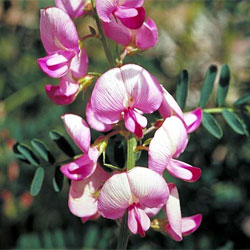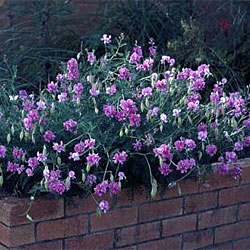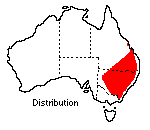Swainsona galegifolia
 |
 |
Darling Pea
Swainsona galegifolia (Andrews) R.Br.
The Darling Pea (Swainsona galegifolia) of inland New South Wales and Queensland is a long-lived shrubby perennial worth having in every garden because of its easy cultivation and very long flowering season.
 Branches
grow annually from the crown and reach a height of about 1 m each year. In a
crown crowded with new shoots, the outer ones tend to be pushed outward and
lead to a more spreading shape, especially if the shrub is allowed ample room
when it is first planted. In groups, plants support each other and lead
to a more upright habit.
Branches
grow annually from the crown and reach a height of about 1 m each year. In a
crown crowded with new shoots, the outer ones tend to be pushed outward and
lead to a more spreading shape, especially if the shrub is allowed ample room
when it is first planted. In groups, plants support each other and lead
to a more upright habit.
Top growth is susceptible to frost and in a cold area such as Canberra, plants may be partly frosted. However, if this wood is cut out at the end of winter it is replaced by strong new stems. Branches are well clothed to ground level with fine pinnate leaves about 10 cm long. They are smooth and sometimes greyish, forming a bold, graceful outline, even without flowers.
Flower spikes are up to 15 cm long and are held well on long stems. They open to sturdy pea flowers nearly 2.5 cm across in colours from pure white through clear pinks and mauves to magenta crimson; these are followed by balloon-like pods, often tinted pink. The best display is in November.
The old flowered branches must be cut out each year at the end of winter, or in warmer climates after the main flowering season in autumn. If this wood is not removed the plant becomes weak and sparse with branches falling about and blowing off in strong winds. Plants are available from some nurseries, but seed is plentiful and easy to raise.
Seedlings should be finally planted out from small pots and will flower about a year later. They thrive in any soil, are useful for a quick cover in a difficult situation and excellent as single specimens. Allow about 1 m spacing in group plantings. Occasional applications of weak fertiliser dressings are helpful in spring and summer.
They are generally pest and disease free but are occasionally attacked by aphids and caterpillars. Swainsona is poisonous to stock.
An annual form of Swainsona - S. canescens - grows up to 60 cm
in height and has violet-coloured flowers in long dense sprays.
Based on text by ANBG staff (1972)
Name meaning: Swainsona galegifoliaSwainsona - after Isaac Swainson (1746 - 1812), an English medical doctor and botanist; galegifolia - with leaves like galega, a well-known Northern Hemisphere shrub of the same family |
![An Australian Government Initiative [logo]](/images/austgovt_brown_90px.gif)

